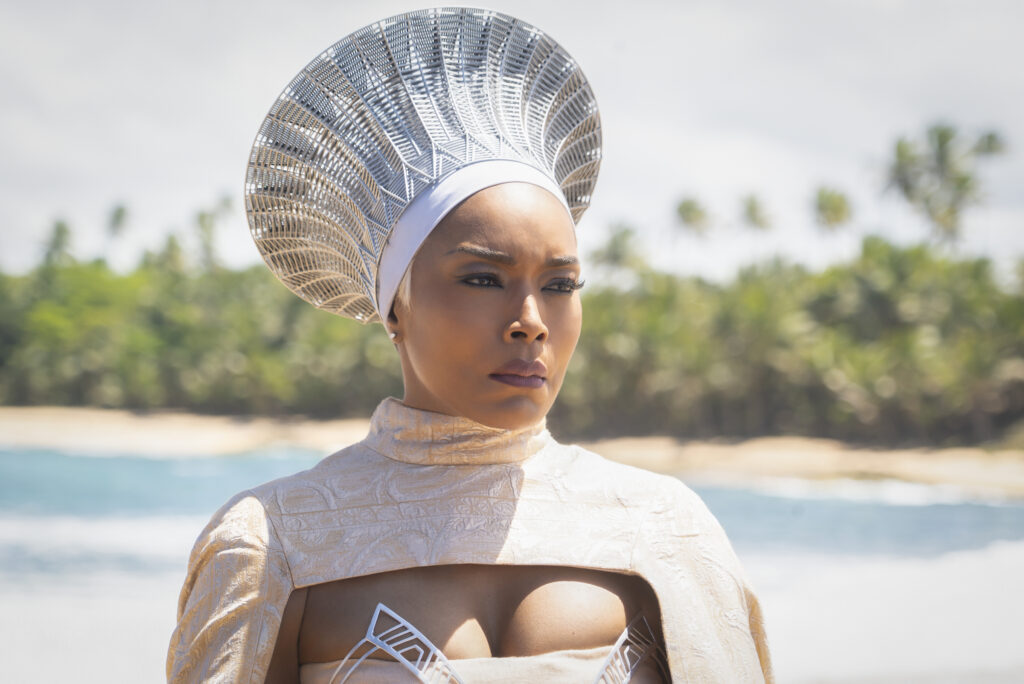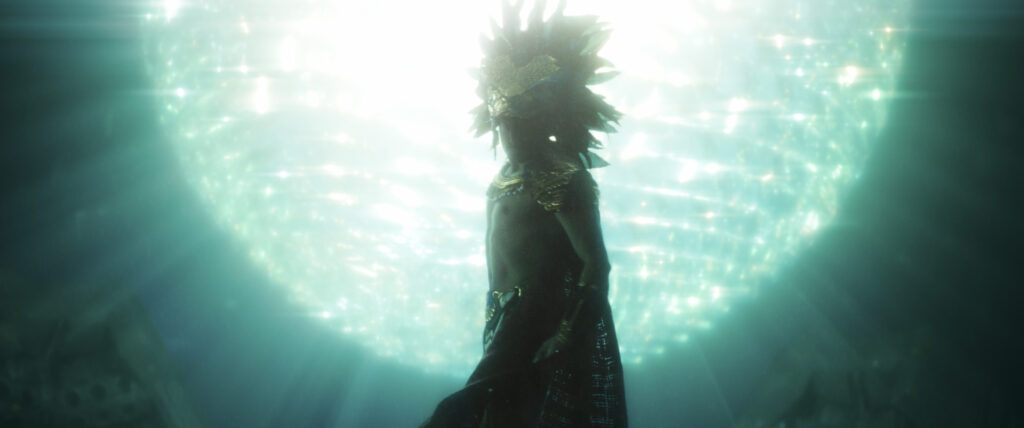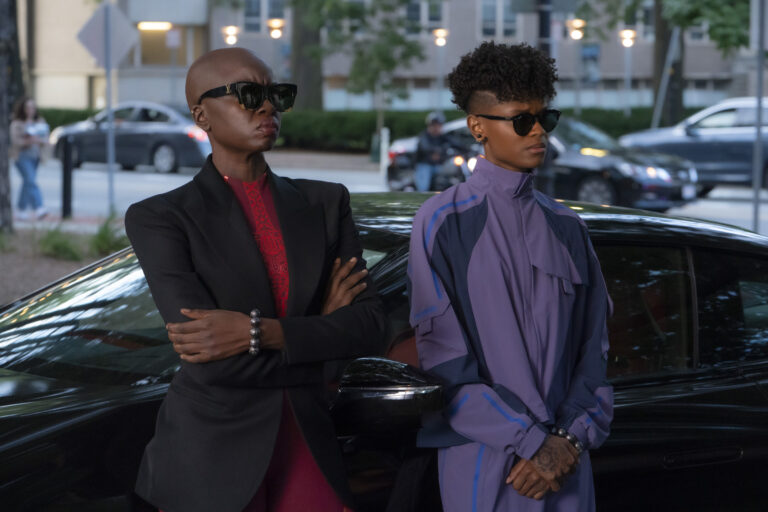Black Panther: Wakanda Forever (2022 | USA | 161 minutes | Ryan Coogler)
Ryan Coogler’s first <i>Black Panther</i> film was the first (and only) Marvel to crack the Oscar ceiling for a best picture nomination. A celebration of Black excellence, it introduced the hidden techno-utopia Afro-futurist kingdom of Wakanda and elevated Chadwick Boseman’s King T’Challa as one of the primary anchors of their ever-expanding cinematic universe. Unlike so many other films in the franchise with outstretched claims of director nonsense (“it’s Three Days of the Condor but with superheroes”), Coogler actually seemed to crack the mold, bringing fresh energy, exceptional performances from a diverse cast, tremendous production design, and thorny issues about the dynastic exercise of power into comic book movies.
The much-anticipated return to Wakanda was further complicated by the intrusion of the sad reality of the real world: the 2020 death of Chadwick Boseman meant that the world lost a great actor to cancer and that Wakanda lost its king and protector. Respectfully, the sequel addresses his passing immediately, without any digital trickery, by opening with the hero’s offscreen death, funeral, and the emotional fallout of being unable to wield their vast technological wonders to save the life of their beloved T’Challa. The opening scenes confront the grief of a family and a country (and by proxy an audience, fanbase, and studio) to make sense of a sudden loss and to slowly figure out how to carry on.

One could imagine an entire film as a study in grief. There’s rich emotional territory in the contrast between Shuri (Letitia Wright), the forward-looking scientific genius who has little interest in her country’s traditional myths and practices, and her mother Ramonda (Angela Bassett), an elegant and powerful widow holding her kingdom together in the successive deaths of her husband and son. Both actresses display the depth of performance to contrast different ways of coping (or not) and the tense mother-daughter dynamics of healing and protection across a generational divide. Bassett is the film’s true anchor with her ever-poised performance as an elegant monarch with steadfast commitment to her people.
Of course, these movies can’t be jewel boxes of sensitive explorations of feelings, so the action soon whipsaws to the outside world. First, by bringing Wakanda to Geneva, where some sort of world governance body is meeting to discuss the security implications of Vibranium, the rare earth metal that seemingly makes Wakanda’s technology indistinguishable from magic. It’s an unlimited energy source, dangerous weapon, and the Wakandans aren’t sharing (“the danger isn’t vibranium, it’s you” proclaims Queen Ramonda, the most striking member of any international gathering). The rest of the world’s thirst for this natural resource and one country’s steely resolve not to share, too, would be grounds for a fascinating examination of the upending of traditional colonialist narratives, a geopolitical thriller about the greed of nation-states and the reorganization of the world order in the face of a mostly-benevolent, self-interested, reclusive new power player.
But, alas. The world shortage of vibranium is yet another digression to introduce what happens when greedy governments go trolling the ocean floor for precious metals. The answer: fish-people singing suicide-inducing siren songs and brutally eradicating a shipful of special forces and deep sea scientists. Let it be said, Coogler stages an unsettling attack scene and isn’t shy about killing off a bunch of government employees in the dead of the night. You heard that right, a cult of mer-warriors who follow a centuries-old godlike king with little wings on his ankles and ride around the ocean on the backs of whales. It’s all pretty ridiculous, but no one in the film dares to laugh.
Indeed, we now have a third plotline that could sustain some real thought-provoking digressions. Yet another long-hidden society with near-limitless powers thanks to the effects of some glowing meteoric magic on local plantlife. The introduction of this new undersea realm gives returning production designer Hannah Beachler another shot at Oscar glory in conceptualizing what it might look like if a group of meso-americans, facing the literal ills of colonialism, were granted gills, super powers, and just peaced-out under the sea, Little Mermaid style, for a few hundred years. As their leader Namor, Tenoch Huerta Mejía has some good scenes as a justifiably angry sea god. But aside from a dreamlike origin story of adaptation in the face of genocidal conquest, the character is so weird and othered that he never quite registers as someone whose side we should take. Further, while the very public, highly splashy attacks make for occasionally accomplished action sequences, they’re in such polar opposition to his core interest in perpetual secrecy that he never earns the audience’s affections as a credibly-conflicted villain or even a potential hero. He rises from his miraculous kingdom to fight with the Wakandans not from any long-standing rivalry between peoples who might otherwise be allied by magic meteor metals, but because a contrived script demands it.

I must emphasize once again, a story in which blue-skinned mermaids and mermen hitch rides on orcas to speed into battles in major American cities and middle of the ocean alike, yet literally no one snickers at the sight of the Sea World navy or comments on the ridiculousness of Namor’s fluttering little ankle wings. While the reverent tone is understandable for a film that’s grappling with the evils of colonialism and the ways that disadvantaged populations become exceptional, some comic relief would have gone a long way toward keeping the long runtime less soggy. Marvel movies earned a reputation as being fun hangs along with all the spectacle, this one could very much have used a few more audience stand-ins to find some wry humor in the self-important bombast.
Again, there are three pretty interesting major themes for a very compelling film and more than two and a half hours to service all of them. Yet Coogler’s script (written with Joe Robert Cole) has corporate obligations to serve as but another cog in the ever-churning, ever-interconnected, never-resting Marvel Empire. Rather than focus on all of the characters we know and love (or at least vaguely remember), including Winston Duke’s vegetarian mountain ruler M’Baku, the powerful warriors of the Dora Milaje (Okoye, Ayo, and Anika as portrayed by Danai Guria, Florence Kasumba, and Michaela Coel), or Lupita Nyong’o’s return as super-spy Nakia, the film recycles the same motivational trope found in each of this year’s other Marvels: there’s a new special teen who some bad person wants to kidnap and/or kill and our heroes must risk everything to save them. Perhaps there’s a feeling that younger audiences need Avengers Babies to connect, but the trope has worn thin.
In this case, it’s a genius student at M.I.T. played by Dominique Thorne who we meet on a covert intel mission gone wrong. Her performance as RiRi Williams is fine, but the only reason that I can imagine for having Namor go after this particular young super genius scientist instead of Letitia Wright’s Shuri is because Marvel is launching an upcoming Disney+ series featuring RiRi (Ironheart) and her homemade Iron Man style suit. These movies used to have fan-service, weird superheroes, and punchlines, now it’s all backdoor pilots and technosuits.
These things need to make money, but aside from feeling like very cynical wake-crashing, it also bloats the film into an over-stuffed series of origin stories. Despite the visuals being perpetually wondrous — these glittering cities, futuristic organic-inspired vehicles sleekly tswooping across the skyline, a fusion of traditional and futuristic rooms — and the primary cast being across-the-board great, I couldn’t help resenting the minutes ticking away as the plot kept getting snagged on tangential stories, including a badly shoehorned bit of Franchise Business to include Julia Louis Dreyfuss’s maybe-evil CIA director and Martin Freeman’s contractually-obligated screen time as the Token Nice White Guy Government Agent Who Means Well. Characters come and go, by the time we remember their connections, backstories, and relevance, the film has pushed on to yet another battle where everyone’s wearing a metal suit to make the CGI rendering less costly.
The film’s central concern — who, if anyone, will take up the mantle of Black Panther — is practically shoved aside as a side quest. This fusion of the mystical roots of the character, the connection to the environment, and the responsibilities to a people ought to have been at the heart-shaped herbal core of this story. It connects the living characters to the dead and is the natural center for the core questions of how one moves on in the wake of tragedy. There are some nice moments when a fun cameo finally prompts questions of how to rule, but the journey feels tertiary and the emotional arcs unfairly compressed.
Despite this litany of complaints, Coogler’s film is by no means bad, it’s just a pity that so many of the genuinely good parts get bogged down. The camerawork is lively and he stages the big action sequences and the close combat sequences with vibrant energy. Remarkably, it’s a major comic book movie that centers its storylines and action on a wildly talented cast of Black women who express a diverse array of concerns and skills. From streetwear to military garb to formal attire, Ruth Carter’s stunningly accomplished costume design is jaw-droppingly great and relentlessly inventive. Importantly, the film treads the delicate balance of paying tribute to Boseman’s legacy while exploring what the future look like for the characters he left behind. That in it and of itself is a remarkable achievement worthy of celebration. The lesson here is that with great expectations come great potential for disappointment, so maybe part of this is on me for wanting it to be so much more than just the best of this year’s crop of Marvel movies.
Black Panther: Wakanda Forever arrives in theaters on November 11. All images courtesy Marvel Studios.




